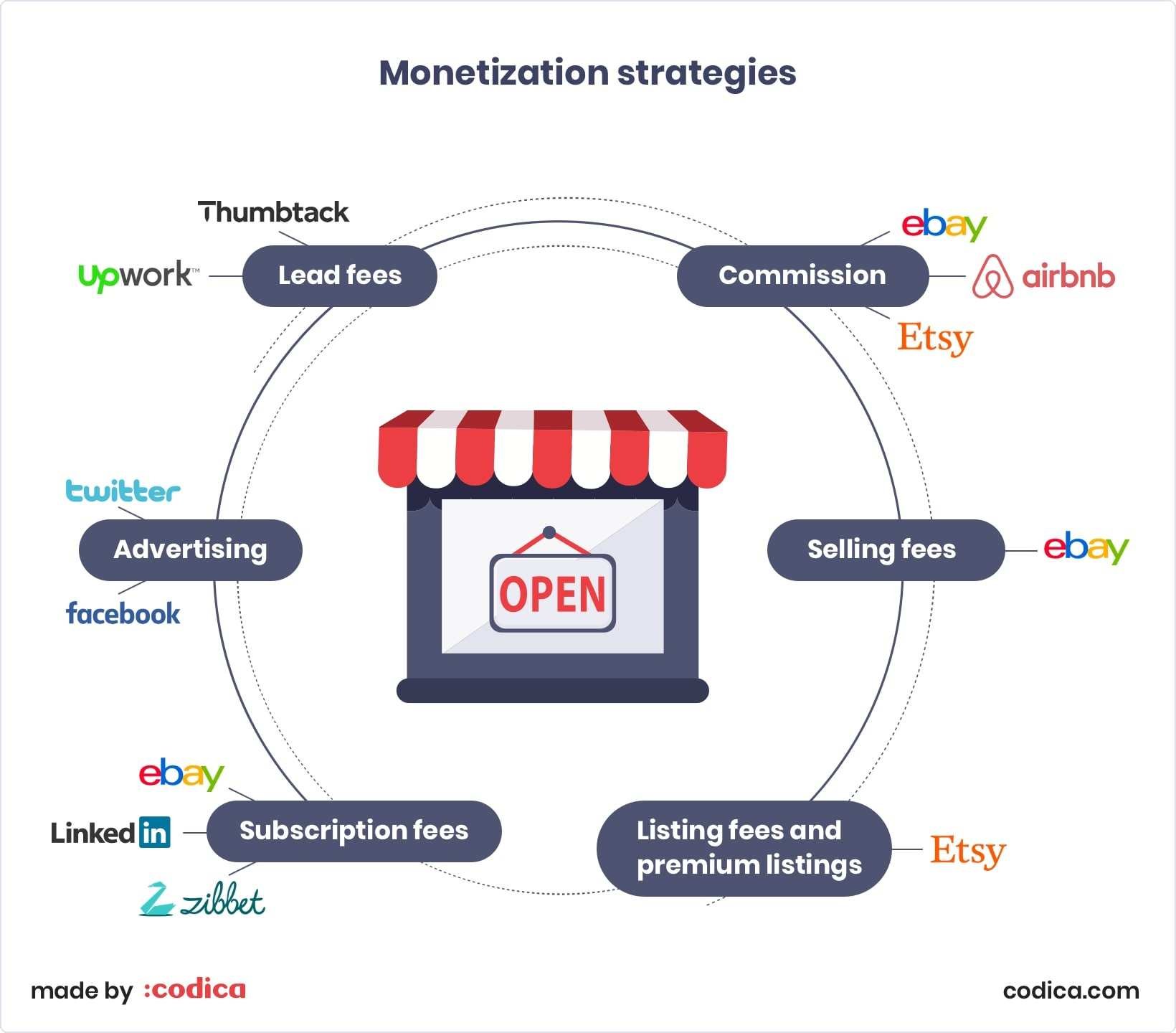Amazon announces that its net sales grew 26% to $75.5 billion in the first quarter of 2020. Fantastic results, right? They inspire entrepreneurs to build e-commerce platforms that could become the next Amazon or eBay.
Surely, marketplace launch can be chaotic, especially when you do not know where to start.
To make things easier, we created a list of steps to take when you consider going into the e-commerce business. You will know what you should do first before delving into online marketplace development.
1. Research and choose your niche
Before you start building a marketplace, define what products or services will be available on your platform.
You have two options to choose from:
- Create a horizontal marketplace;
- Create a vertical marketplace.
The first variant is a horizontal marketplace launch. Such platforms cover a variety of items. For instance, Amazon spreads over a great number of categories and products, from books to electronic devices.
The clear benefit of this approach is greater coverage. At the same time, pinballing between several market segments, you lose a chance to become a leader in a specific domain.
Alternatively, you can build a vertical e-commerce platform. It supposes the focus on a specific niche or a particular user category.
Why is the vertical marketplace launch a more sensible choice?
First, the narrow focus allows you to highlight the benefits and specific features of each item you provide. You can attract new visitors with detailed product or service descriptions. It is a good way of making your offerings more useful and valuable for the target audience.
Second, niche marketplaces give users a more personalized customer experience. It is because buyers can find a specific solution to a particular issue on these websites.
Further reading: How to Build a Multi-Vendor Marketplace Website From Scratch
2. Learn your target audience
Your next step is to define what user category you are going to serve on your marketplace platform. Why is it so important? Knowing your target audience, you will be able to set out the general direction for your marketing.
For example, if you know the pain points and needs of your potential customers, you can adapt your value proposition accordingly. Your main goal is to make it relevant to a particular problem.
Think carefully about your consumers. What do they want? When you know the answer, you can meet their expectations. As a result, users will have positive emotions from using your product.
Finally, the analysis of your target audience helps solve the chicken and egg problem or getting the buyers and sellers to use your platform. It allows you to choose the right communication channels, content, and marketing strategies. As a result, you will be able to promote your products and services more effectively.
When defining your target audience, take into account the following factors:
- Age;
- Gender;
- Location;
- Education;
- Occupation;
- Interests.
3. Select a business model
It goes without saying that your marketplace startup should bring you a stable profit. For this reason, you should choose the right online marketplace business model. Remember that it should offer reasonable conditions for your potential vendors.
Let’s take a closer look at the best monetization strategies used by the e-commerce giants, such as Amazon, eBay, and others:
- A commission cuts a part of each transaction made through your platform.
- A listing fee is a sum charged from a vendor when they publish their items on the marketplace.
- A subscription fee is a marketplace business model when a seller pays a charge to get access to your e-commerce platform. It contains monthly or yearly fees for a definite set of benefits.
- An advertising fee is about promoting items on your website by third-party advertisers.
- Lead fees. This online marketplace business model means that users pay for access to the detailed information about the desired item.
- Premium membership gives users access to extra features and exclusive content.

To wrap up the topic, choosing the right revenue models is crucial for making a profit on your platform. Starting with one monetization strategy, you can progress to complex models. This way, you will also help vendors make the most of your marketplace.
4. Write a business plan for marketplace launch
Now it is time to create a business plan. There are several reasons why you need this document for a successful marketplace launch.
To begin with, a business plan serves as an important tool for outlining your overall goals. It will enable you to track your progress when your e-commerce platform starts to grow.
Second, an online marketplace business plan reduces risks and helps avoid big mistakes. Creating this document allows you to foresee potential issues before they arise.
Finally, the business plan is a must-have document if you are looking for third-party investors for your marketplace launch. If you want people to put their money in your project, you should prove the viability of your online marketplace business ideas in the long run.
With this document, you will be ready to discuss such important questions as financial projections or exit strategy with your potential investors.
These are the main points your multi-vendor marketplace business plan should include:
- Review of your enterprise as a whole;
- Your marketplace description, including your goals and objectives;
- Description of products and services your vendors provide;
- Information about your target audience, the niche you chose, and competitors;
- The online marketplace strategy and ways of its implementation;
- Your team’s organizational structure;
- Financial plan with a business model and projections.
5. Find a reliable co-founder
Surely, you can run your online marketplace business solo. However, it would be better to have a reliable co-founder at your side.
Let’s take a look at key reasons why you need such a person.
First, some investors tend to trust companies with several founders more easily. It means that having a trustworthy co-founder increases your chances of getting funding for the marketplace launch.
Moreover, the co-founder will assist you in making important decisions. Also, this professional will divide the stress and responsibilities related to the e-commerce business.
In addition, this person can assist you in developing another project sphere. If you are great at the business side, you can pick a person experienced in hiring people, or in technical aspects of marketplace launch. Thus, your strong sides will complement their weak sides, and vice versa.
Before starting a collaboration, make sure you have found the proper co-founder. Pay attention to their educational background, experience, and proof of their capacities. Only in this case, you will get a partner who will help fix your business problems.
6. Search for compatible investors
If you consider marketplace launch, you need money to translate your project into reality.
What if you don’t have enough funds for financing your online marketplace idea? What should you do? In this case, you have to turn to other sources of funding and seek outside investors.
In this regard, it would be a good idea to find investors who may be interested in your kind of business. For example, attend events, conferences, and meetings they hold or attend.
Can you find an investor online? Sure, you can visit specialized professional platforms, like AngelList or Crunchbase. The latter allows customizing your filters to find the right depositor.

It is worth noting that finding an investor is not only about injecting funds. This person can become a source of advice and strategy.
Find the right funders interested in your marketplace success, and they will speed up the marketplace launch. With their help, your business will grow faster.
You may also like: Market Networks: the Future of Service Marketplaces?
7. Protect your intellectual property
Now it’s time to protect your online marketplace business legally. Define if you need to set copyrights, patents, trademarks, or special licenses. Why is it important?
Other people can make a profit from your ideas if you do not protect your concept. So you should have the documentation that proves you own the assets mentioned.
Here are the ways which will help you make your product safe and sound:
The patent is a set of exclusive rights. It is granted to an inventor for a restricted period in exchange for detailed public disclosure of an invention.
The trademark is used to represent a company or product. It can be a symbol, word, or several words that are legally registered. You need it to protect your marketplace name.
The copyright is a collection of exclusive rights granted to an inventor and spread over a literary work, song, movie, or software. For example, you can protect your website content, including articles, descriptions, etc.
The domain name is the part of a network address that identifies it as belonging to a particular domain.
Applying these methods, you can be sure that your marketplace is highly protected and is recognized by the courts and competitors.

Final thoughts
As you may see, the marketplace launch requires serious preliminary work. You need to choose your niche and target audience, find the right business partner and investors.
Only after that, you can proceed to online marketplace development.
Still, if everything is done right, you will get a fast, easy-to-use, scalable, and profitable e-commerce platform.
If you are browsing online marketplace companies, we are here to help you. Contact us to discuss your project idea and get a free quote.
